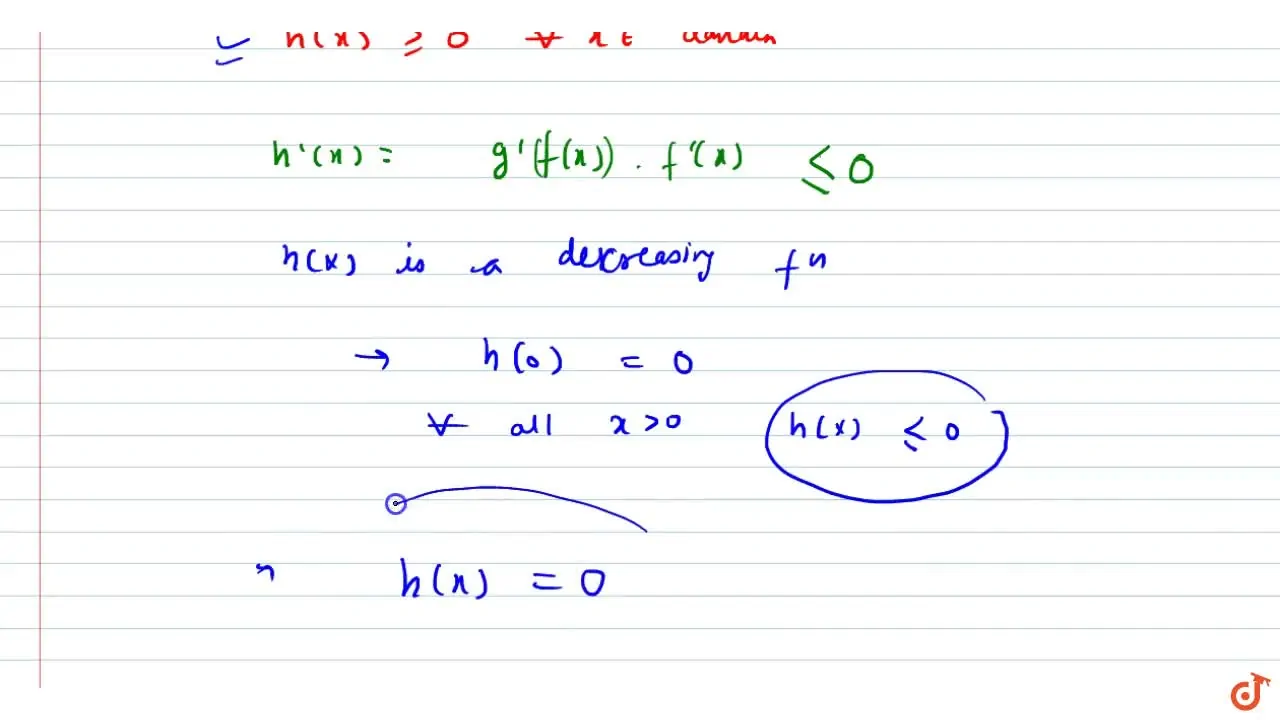Let f:[0,∞)−−−→0,∞andg:[0,∞)−−−→0,∞ be non-increasing and non-decreasing functions, respectively, and h(x)=g(f(x)). If fandg are differentiable functions, h(x)=g(f(x)). If fandg are differentiable for all points in their respective domains and h(0)=0, then show h(x) is always, identically zero.
Step by step video & image solution for Let f:[0,oo)vec[0,oo)a n dg:[0,oo)vec[0,oo) be non-increasing and non-decreasing functions, respectively, and h(x)=g(f(x))dot If fa n dg are differentiable functions, h(x)=g(f(x))dot If fa n dg are differentiable for all points in their respective domains and h(0)=0, then show h(x) is always, identically zero. by Maths experts to help you in doubts & scoring excellent marks in Class 12 exams.
Similar Questions
Let f:[0,∞)−−−→0,∞andg:[0,∞)−−−→0,∞ be non-increasing and non-decreasing functions, respectively, and h(x)=g(f(x)). If fandg are differentiable functions, h(x)=g(f(x)). If fandg are differentiable for all points in their respective domains and h(0)=0, then show h(x) is always, identically zero.
View SolutionLet f (x ) and g(x) be increasing and decreasing functions respectively from [0,∞)to[0,∞) Let h (x) = fog (x) If h(0) =0 then h(x) is
View SolutionIf f(x) is a differentiable function of x then limh→0f(x+3h)−f(x−2h)h=
View SolutionLet fandg be increasing and decreasing functions, respectively, from [0,∞]→[0,∞]. Let h(x)=f(g(x)). If h(0)=0, then h(x)−h(1) is always zero (b) always negative always positive (d) strictly increasing none of these
View SolutionLet f:(0,∞)→R be a differentiable function such that f'(x)=2−f(x)x for all x∈(0,∞) and f(1)=1, then
View SolutionLet f be a differentiable function with range (0,∞) and g(x)=(f(x))2−(f(x))3+(f(x))4, then
View SolutionShow that f(x)=1x is a decreasing function on (0, ∞) .
View SolutionLet f:[0,∞)→[0,∞) and g:[0,∞)→[0,∞) be two functions such that f is non-increasing and g is non-decreasing. Let h(x)=g(f(x))∀x∈[0,∞). If h(0)=0, then h(2020) is equal to
View SolutionThe number of points at which the function f(x)=max{a−x,a+x,b},−∞<x<∞,0<a<b cannot be differentiable is :
View SolutionIf f:R→R is a differentiable function such that f′(x)>2f(x)forallxRandf(0)=1,then: f(x) is decreasing in (0,∞) f′(x)<e2x∈(0,∞) f(x)="" is="" increasing="" in="" (0,∞)="" f(x)=>e2x∈(0,∞)>
View Solution


